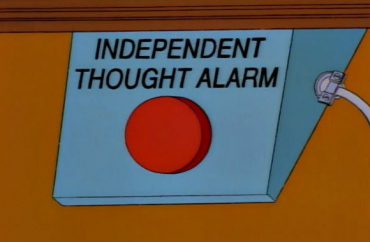
Dialogue is increasingly impossible in higher ed
College is—or is supposed to be, or was, at some point—a place of healthy and robust debate, an institution where you go not to have your priors confirmed but to challenge your entire worldview. Unfortunately, at many if not most universities across the country, that ideal seems to have been abandoned in favor of a kind of suffusing blanket of political correctness: in many cases, college appears to be the place where debate goes to die.
This is not accidental. A quiet kind of campaign has been waged at American colleges for the past few decades or so, one that has subtly yet ruthlessly attempted (and in many cases succeeded in) stamping out alternative points of view. Any mildly conservative college student of the past thirty years up until the present day will be familiar with both the uniform political and cultural opinions of campus life and the rather merciless way in which those opinions are enforced.
Consider a recent story reported on by The College Fix: the Mustang News, the student newspaper at California Polytechnic State University, recently issued an apology for running an op-ed that questioned some of the arguments in favor of tolerating homosexual behavior. The author of the op-ed stated explicitly that he was not attempting to adjudicate fully the question of whether or not homosexual behavior should be tolerated or opposed; rather, he was simply attempting to show that a number of arguments in favor of homosexual tolerance (“love is love,” “it’s not hurting anyone,” etc) are insufficient and should not be relied upon by LGBT advocates.
It was a fine op-ed, well-argued and thought-provoking and very much needed at a time of great contentious debate over LGBT issues. It would be bizarre for anyone to take offense at the piece. Naturally, the campus was scandalized. “Publishing this opinion piece,” wrote the Mustang News’s editor-in-chief, “has caused this campus and the marginalized groups in it a lot of pain and we are deeply sorry.” The piece “did more harm than start a conversation,” she argued, and it “angered and hurt many of those on my own staff.” The editor claimed she and her staff were “naïve” in the publication of the article. She apologizes no less than three times in the editorial (four, if you count the headline). “[W]e are ready to do what we can,” she wrote, “to regain your trust as a reliable news source. “
Well. The idea that a newspaper has ceased to be a “reliable news source” because it published a contentious opinion piece is, to put it lightly, kind of insane. We are all well-aware that many of our colleges have become hotbeds of wailing outrage when it comes to progressive political ballyhoos, but it still gives one pause to see a newspaper editor besmirch her own publication because some people were upset over a controversial article. If this is what Cal Poly is teaching its student journalists—to roll over and beg for forgiveness because of a column addressing a heated debate—then it’s worth questioning why the Mustang News exists at all: is the student newspaper supposed to print Betty Crocker recipes and inoffensive pictures of kittens and flowers, or is it supposed to behave like an actual newspaper?
In spite of the insistence of our campus political enforcers (and the newspaper editors who enable them), there is, in fact, nothing wrong with debating the rightness or morality of homosexual behavior: it is a phenomenon with serious public health and public policy imports and has been a contentious source of dialogue in Western civilization for thousands of years. This doesn’t mean that it’s wrong or that it’s right; merely that it’s debatable.
A healthy and functioning college campus would not oppose such debate; rather, it would welcome the debate, engage it, wrestle with it. It is, of course, overwhelmingly likely that the vast majority of students at Cal Poly would come down in favor of tolerance on this issue; that is their prerogative, of course, and in the spirit of debate we must acknowledge that they might be right. But when people are hopelessly scandalized by the debate at the outset—when the campus climate is such that a newspaper editor has to apologize for doing her job—then genuine, productive dialogue becomes that much more unlikely. But then, that’s kind of the point, isn’t it?
MORE: Swarthmore student newspaper apologizes for op-ed telling students to ‘stop whining’
Like The College Fix on Facebook / Follow us on Twitter
IMAGE: Frinkiac





Please join the conversation about our stories on Facebook, Twitter, Instagram, Reddit, MeWe, Rumble, Gab, Minds and Gettr.